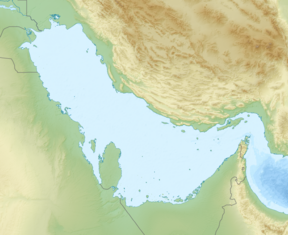Jabal Qihwi
| Jabal Qihwi | |
|---|---|
| Jabal Qa'wah | |
 View of Jabal Qiwhi / Jabal Qa'wah | |
| Highest point | |
| Elevation | 1,735 m (5,692 ft) |
| Prominence | 1,435 m (4,708 ft)[1] |
| Isolation | 23.36 km (14.52 mi) |
| Coordinates | 25°44′35.7″N 56°12′36.4″E / 25.743250°N 56.210111°E |
| Naming | |
| Native name | جبل قاوي (Arabic) |
| Geography | |
| Location | Musandam Governorate |
| Country | |
| Parent range | Hajar Mountains |
Jabal Qihwi or Jabal Qa'wah (Arabic: جبل قهوي, romanized: jbl qhwy) (1,735 m (5,692 ft)), along with the Jabal Al Harim (2,087 m (6,847 ft))[2] and Jabal Bil Ays / Jebel Jais (1,911 m (6,270 ft)), [3] are the three highest and most representative mountains of the Musandam Governorate, in Oman.
Jabal Qihwi has a prominence of 1,435 m (4,708 ft) and a topographic isolation of 23.36 km (14.52 mi),[1] and rises in the central area of the western boundary of the drainage divide of Karsha / Wadi Khabb Shamsi.
Its summit lies on the drainage divide, between the basins of the Wadi Khabb Shamsi (which pours into the Gulf of Oman) and the Wadi Bih, which has its main sources of origin on the southern and eastern slopes of the Jabal Al Harim (2,087 m (6,847 ft)), also in the Musandam Governorate, and pours into the Persian Gulf, landing in United Arab Emirates territory.
The steep slope of the mountain, divided into short and high steps,[4] contains two relevant peaks: the northern peak (Jabal Qihwi), and a lesser peak 450 m (1,480 ft) to the south, on which there is a weather station, is named Jabal Khabb in some maps, with an elevation of 1,708 m (5,604 ft).

At 6 km (3.7 mi) north of Jabal Qihwi is the village and mountain pass of Aqabat al Asu / Aqabat Oso,[5][6] situated also on the water divide line, at 940 m (3,080 ft).
Through this mountain pass runs a dirt road of 36 km (22 mi), called Wadi Khabb Shamsi Road, which starts at Dibba Al-Baya, and terminates at the Wadi Bih - Ras Al Khaimah Road (both ends in the Musandam Governorate), and can be used for all-terrain vehicular traffic. The route employs a good deal of the river bed of the Wadi Khabb Shamsi and some of its tributaries, and to cross the mountain range overcomes an accumulated positive slope of 1,750 m (5,740 ft) and a negative slope of 1,500 m (4,900 ft).
Toponymy


Alternative names: Jabal Kawa, Jabal Qa`wa, Jabal Qa`wah, Jabal Qa‘wa, Jabal Qa‘wah, Jabal Qihwi, Jebel Qihwi.[7]
The name of the Jabal Qihwi (with the spellings Jabal Qa'wah and Jabal Qa'awah) appears recorded in the documents and maps prepared between 1950 and 1960 by the British Arabist, cartographer, military officer and diplomat Julian F. Walker, for the work carried out to establish the borders between the then called Trucial States, later completed by the Ministry of Defense of the United Kingdom, on 1:100,000 scale maps published in 1971,[8] and in other previous documents kept in the National Archives of the United Kingdom.
Population
The geographical area of Jabal Qihwi was historically populated by the semi-nomadic Shihuh tribe, section of Bani Shatair (Arabic: بني شطير),[9] one of the two main sections of the tribe, which occupied, among other territories, the tribal areas of Maqadihah and Dihamara. [10]
See also
- List of mountains in Oman
- List of wadis of Oman
- List of mountains in the United Arab Emirates
- List of wadis of the United Arab Emirates
- Middle East
References
- ^ a b www.peakbagger. com - Jebel Qihwi, Oman
- ^ www.peakbagger. com - Jebel al Harim, Oman
- ^ www.peakbagger.com - Jabal Bil Ays, Oman
- ^ "Jebel Qihwi - Western Route - Wadi Niqab - Ben Robbins". www.wikiloc.com. Retrieved 2024-05-20.
- ^ Tribulus - Volume The Flora of the Ru'us al-Jibal -the Mountains of the Musandam Peninsula: An Annotated Checklist and Selected Observations - Gary R. Feulner - Abu Dhabi, United Arab Emirates, 2011 <https://enhg.org/Portals/1/trib/V19/TribulusV19.pdf>
- ^ www.mindat.org - ' Aqabat al 'Āsū, Musandam, Oman
- ^ https://www.agda.ae/en/catalogue/tna/air/5/1284/n/46 Persian Gulf and Arabian Coast: mountains or mounds - Ref. AIR 5/1284 - 1936 - The National Archives, London, England
- ^ https://www.agda.ae/en/catalogue/tna/fco/18/1863/n/1 Map of Trucial States, Muscat and Oman - Rams - Scale 1:100 000 - Published by D Survey, Ministry of Defence, United Kingdom (1971) - Edition 3-GSGS - The National Archives, London, England
- ^ Lancaster, William; Lancaster, Fidelity (July 2011). Honour is in Contentment: Life Before Oil in Ras Al-Khaimah (UAE) and Some Neighbouring Regions. Walter de Gruyter. ISBN 9783110223408.
- ^ https://www.agda.ae/en/catalogue/tna/fo/371/132894/n/76 Tribes of Trucial States coast - Ref. FO 371/132894 - 1958 - The National Archives, London, England
External links
![]() Media related to Jebel Qihwi at Wikimedia Commons
Media related to Jebel Qihwi at Wikimedia Commons







